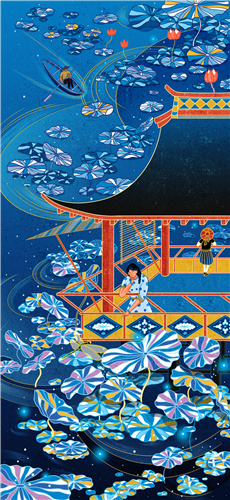Festival greets summer with traditional flair


The beauty of lixia has also been extolled by many literati, with the literature and poems passed down now viewed as masterpieces. Lu You, a Song Dynasty poet, wrote: "The red flags are erected all over the city to greet the Sun God who is ready to drive back to his throne; the mud is fresh, the swallows are rejoicing in the nest; the flowers are exhausted, and the bees are sparser; the shade of the locust and willow trees is thickening; summer heat is yet to climb up the curtains and windows; the sun slants west, and after a relaxing bath, I skillfully try on summer clothes."
Back in Banshan, Hangzhou, on lixia last year, along the way to the maiden's temple, the gongs and drums were clamorous, the flags were flying high, the curving hill road scalloped the edge of the light blue sky, the onlookers transformed into a crowd, and the worshippers blessed them with happiness and well-being.
Today in Banshan, the Ni family and its clansmen believe the Lixia Festival held by the temple is the right way to enhance cohesion in their community. The power of the solar terms and folk customs are blended together, Ni insists.
Adjustment and innovation are introduced. These include a temple fair that incorporates an intangible cultural heritage market and handicraft trading. Activities, such as running events on the mountain, are held to underline the solar term's principal purpose of striving for a healthy physique.
"Establishing such a festival and attracting wider public attention can help people become interested in these various, unfamiliar festival symbols and learn more about lixia," says Li Yiming, a PhD of history studies at Shandong University.
Debates on how to protect, revitalize and introduce traditional festivals have never ended, but Li believes it is the cultural memories behind these customs and beliefs that matter the most.
"The Lixia Festival might be viewed by many as a mere performance. However, through the symbols of such festivals, we can still inherit the cultural memory of the farming era that has gone before. We know how and why our ancestors lived on this land at such a time. That's good enough, isn't it?" he asks.





































